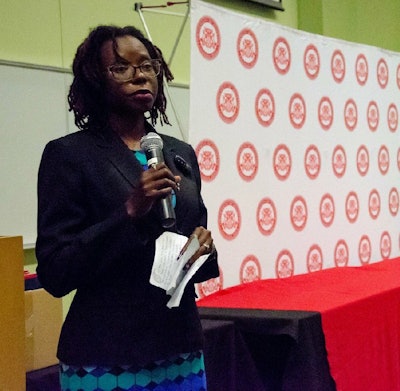For many single mothers who are attending college, the joyful moments of motherhood are mixed with the challenges of classes, research papers and final exams — along with jobs, child care and housework.
A briefing paper released this week by the Institute for Women’s Policy Research found that single mothers who are full-time college students spend the equivalent of a full work day on child care and housework, and more time in paid employment than women students without children.
 Koretta B. Knox
Koretta B. KnoxPhoto Credit: SURE Program
And importantly, they also spend less time on “critical self-care activities such as sleep and exercise” and have less time for studying, according to the report, which was based on analysis of data from the American Time Use Survey.
“As we approach Mother’s Day and college commencement season, we often recognize the dedication of time and energy that mothers and graduating seniors have made,” said Lindsey Reichlin Cruse, the institute’s senior research associate. “Single mothers in college are doing double and triple duty to make a better life for their families, but too few have the support needed to juggle the competing time demands of college, parenthood and employment.”
On average, according to the analysis, single mothers who attend college full time spend nine hours a day on care and housework — two hours on active child care, six hours on supervisory care and about two hours on housework.
Women college students without children spend under two hours each day on all of these activities combined. The briefing paper includes policy recommendations for improving access to child care and other ways of helping single mothers address their time demands while completing their degrees.
The policy paper, based on student parent data from Monroe Community College in Rochester, N.Y., stated that about 71 percent of student parents who used the campus child care center persisted to the next fall semester, compared with 42 percent of those who did not use the center. In addition, student parents who used the center had an on-time graduation rate that was more than three times higher than those who did not use campus child care.
Koretta B. Knox, a marketing major at Texas Southern University’s Jesse H. Jones School of Business, has been on “this very long journey” of matriculation since the early 2000’s, when she earned her associate’s degree while serving 6 ½ years in prison. Since her release in 2006 she has had starts and stops, but began a serious pursuit of her bachelor’s degree in 2013 and is currently classified as a senior.
“I was in school fulltime and worked a lot of overtime at Dairy Queen and Jack in the Box,” she said, explaining that the campus daycare operated on a lottery system, and she wasn’t selected. Her parents, who live nearby, helped by picking up her son from school and taking him to visit with her at the restaurant.
“That’s the only way I got to see him for a while,” Knox recalled. Those were tough years, but she persisted. Her son is now 10 and she and her husband have reunited.
Her education in marketing sparked an idea of how she can make a difference.
“I have been given the gift of determination, so I can’t give up,” she said. “But everybody doesn’t have that gift.” So, she is developing a non-profit program to “house, employ and educate women to be entrepreneurs.”
Knox’s experience reflects many of the difficulties confronting single mothers who attend college against incredible odds. The IWPR analysis offers a range of recommendations for institutions and government to address the problems, including:
• Federal, state, and local governments can make more funding for child care available for students on college campuses.
• States should allow college enrollment to count toward work requirements associated with Child Care Development Fund child care assistance.
• States and higher education institutions can provide targeted financial aid to allow students with children to minimize time spent working and to allow students to afford more paid child care.
• Governments can take steps to make Early Head Start and Head Start programs more widely available on college campuses.
• Colleges can implement strategies to establish flexible and welcoming environments for students with children.
According to the report, “Better access to affordable child care — on college campuses and in communities more widely— could lead to significant increases in degree attainment among single mothers, improving their long-term economic security and benefiting their children and society more broadly.


















